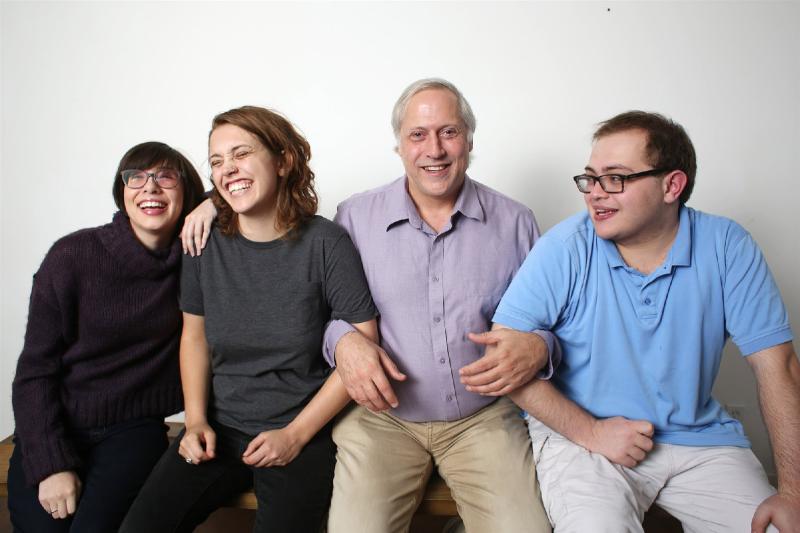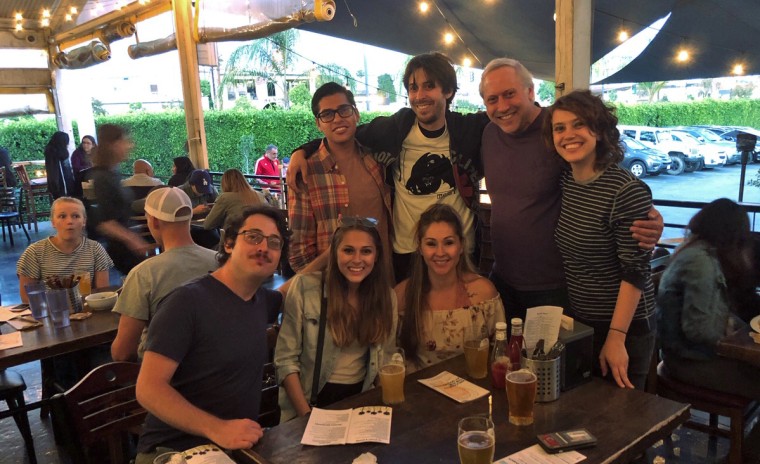From sperm donor to 'Dad': When strangers with shared DNA become a family



When Peter Ellenstein goes out to dinner with his children, who range in age from 17 to 30, the meals are raucous, and there is always a lot of catching up to do — especially because no one in the family knew each other before last October.
Ellenstein, 57, donated sperm anonymously in his 20s and early 30s to make some extra cash, and never expected to meet any of his offspring. But this past year, thanks to online tools, including DNA test kits, he discovered that he has at least 24 biological children. A divorced theater director living in Los Angeles who never raised any kids of his own, Ellenstein has met 20 of them so far. One calls him every day and recently took a three-week trip to Europe with him; others are less involved, but still show up to family dinners, some with the hope that he’ll pick up the check.
When Ellenstein first found out about his offspring, “it was just a huge shock,” he said. Fearing the interactions might be awkward or disappointing, he was initially reluctant to meet his children.
Now, though, his life revolves around them — whether he’s proudly introducing them to his mother or helping them play practical jokes on one another.
 Peter Ellenstein, seen here with six of his 24 biological children in May 2018, lets his offspring guide the nature of his relationship with them. "I don't want to become someone who is a problem in their life," he said. Courtesy of Peter Ellenstein
Peter Ellenstein, seen here with six of his 24 biological children in May 2018, lets his offspring guide the nature of his relationship with them. "I don't want to become someone who is a problem in their life," he said. Courtesy of Peter Ellenstein “It’s the best thing that’s ever happened to me,” he said. “Each kid so far that I’ve met is a whole other adventure and a whole new exciting thing in my life.”
As more donor-conceived children connect with each other and their biological parents thanks to social media and at-home genetics tests such as 23andMe and Ancestry.com, a new kind of modern family is emerging. The first meeting between half-siblings and sperm donor dads can be fraught, but what follows over the ensuing years may be even more complicated. Some children grow close with their biological fathers and half-siblings, even moving in with them. Others are more hesitant, unsure of how or whether to build a relationship with people whose existence, in some cases, was a family secret.
The newly formed connections raise delicate questions: Should a sperm donor who didn’t raise his children refer to them as his son or daughter? Should they call him Dad? And how does the introduction of this new blood relative affect existing relationships with the parents and siblings that a person grew up with?
NBC News spoke to more than a dozen sperm donors, donor-conceived children and parents who received sperm donations about what happens when strangers with shared DNA get to know each other. Some donor-conceived children spoke glowingly of spending Father’s Day with their sperm donors. Others described friction with the parents who raised them. One recalled learning in her 30s that she was donor-conceived, which set off panic attacks over her sense of self, even though she and her sperm donor get along well.
And for others, the hoped-for relationship never materialized at all.
“There’s no social script for any of these scenarios,” said Erin Jackson, founder of We Are Donor Conceived , a support group and resource page with more than 650 members on Facebook.
Jackson, 38, of San Diego, started the group in 2016 after finding out that she had been donor-conceived. She had tracked down her biological father and sent him a letter, tucking a photo of herself inside. He didn’t write back until two years later, and when he finally did, “he basically told me to get lost,” Jackson said. “I tried not to get my hopes up, but I was still disappointed.”
Now, she helps others navigate the emotional twists and turns.
“There’s never a dull moment,” she said.
Read more at seeded content.

Unforeseen outcomes. Donating sperm in your 20's could yield you some unexpected family in your 50's. Something akin to when your mothers give up children for adoption, never expecting to see them again, but the male version.
A new kind of relation? An oddity? New life complexities to explore for sure.
I wonder how many people don't realize they are related. More importantly, I wonder if some may be cohabiting and not realize it. Could DNA connections be confused for chemistry?